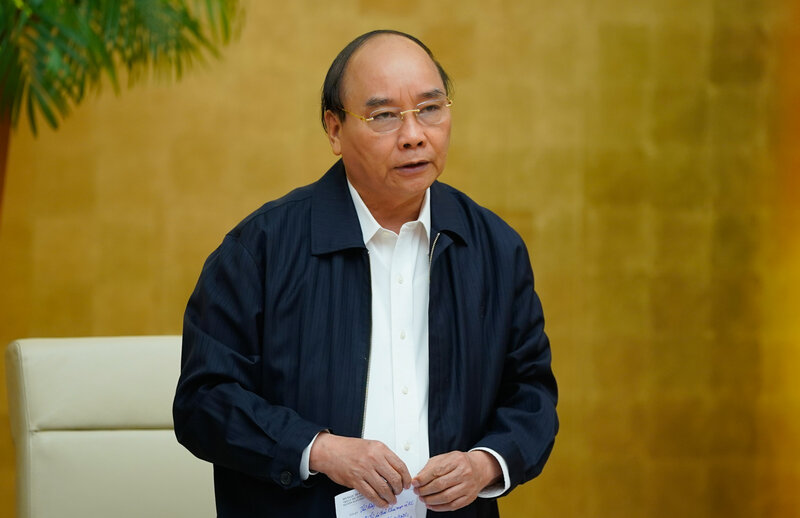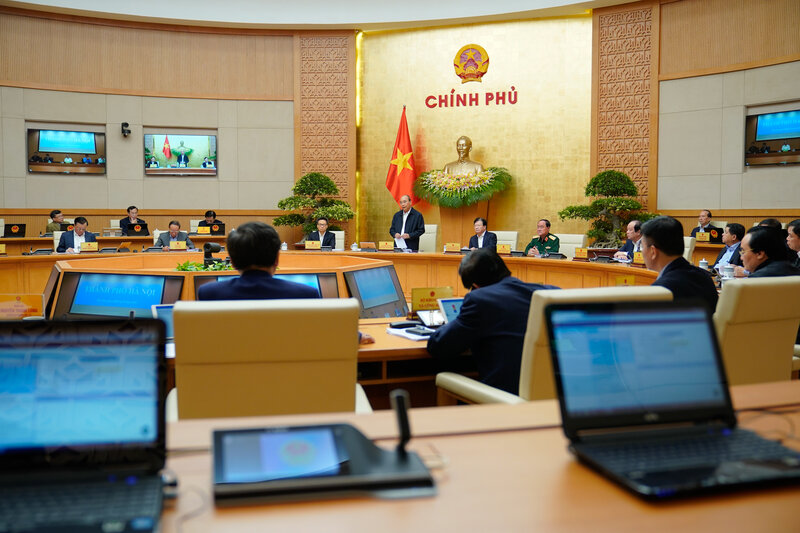Vietnam GDP growth on course to reach 3% despite severe flooding: PM
Major cities such as Hanoi and Ho Chi Minh City should set an example in economic recovery efforts, Prime Minister Nguyen Xuan Phuc has said.
Despite severe consequences from flooding in Vietnam’s central region, the country’s GDP growth remains on track to expand 2 – 3% this year, according to Prime Minister Nguyen Xuan Phuc.
| Prime Minister Nguyen Xuan Phuc at the meeting. Photo: Quang Hieu. |
Vietnam’s economy moved on from its rock-bottom in the second quarter and was on the V-shaped recovery in the third one, said Mr. Phuc at a monthly government meeting on October 30.
Notably, the number of newly established enterprises in October sharply rose 19% month-on-month while the number of enterprises resuming operations also increased 10% year-on-year.
Mr. Phuc noted as the Covid-19 pandemic has been put under control, Vietnam is now able to focus on economic recovery efforts.
The Vietnamese PM said the government has rolled out new supporting programs in replacement of the previous ones, especially a supporting program worth VND16 trillion (US$688 million) that is more accessible for the business community.
In October, the consumer price index (CPI), the main gauge of inflation, expanded at a five-year low of 0.09% against September and last December. This resulted in an expansion of 3.71% of the index in the first ten months of this year.
Meanwhile, the country’s trade surplus reached a new height of US$18.7 billion in the ten-month period, indicating a speedy recovery of exports.
Another highlight of the economy is the disbursement rate of public funds coming at 70% during the period, the highest in the past five years and up 34.5% year-on-year.
The International Monetary Fund (IMF) has predicted Vietnam to remain the only economy in the Southeast Asian region to deliver positive growth in 2020 at 1.6%, taking the country’s economic size to US$340.6 billion and leapfrogging Singapore to be the fourth largest economy in the region.
The World Bank and Standard Chartered have also forecast Vietnam’s economic growth to be in range of 2.5 – 3% in this year.
| Overview of the meeting. Photo: Quang Hieu. |
Cautious against Covid-19 resurgence
Mr. Phuc, however, noted there remain major challenges to the economy, including the Covid-19 pandemic, trade and technology tension globally, uncertainties in the international financial market, and natural disasters.
In the domestic front, the industry and construction sector continues to be under negative impacts from a disrupted global supply chain while the recovery of services and domestic consumption has not met expectations, he said.
The country must step up efforts in pursuing the dual target of both containing the pandemic and boosting economic growth, asserted Mr. Phuc, adding the first priority is to deal with the damage and losses caused by natural disasters in the central region and help local people overcome the hardship.
Mr. Phuc asked government agencies to stay cautious against the risk of Covid-19 resurgence in the country, requesting close supervision of trading activities and people entering the country.
Vietnam would continue to support experts, investors and Vietnamese people returning to the country, he noted.
Hanoi to set example in economic recovery efforts
Among measures to boost economic growth, Mr. Phuc said Vietnam would continue to speed up the implementation of energy projects and promote domestic consumption.
He urged local governments and government agencies to accelerate the disbursement of public funds, including those financed with official development assistance (ODA), and asked for more efforts from leaders at each agency, unit in this process.
Major cities, such as Hanoi or Ho Chi Minh City, should set an example in disbursement of public investment fund and state budget collection, Mr. Phuc requested.
The Ministry of Information and Communications is responsible for realizing the digital transformation strategy, including the development of digital economy, digital government and cashless payment. Regarding this aspect, Mr. Phuc noted the necessity of upgrading the digital infrastructure to implement 5G nationwide.
Mr. Phuc requested the Ministry of Planning and Investment and other related agencies to speed up the implementation of the government’s supporting programs and draft new ones.
In this difficult situation, the government is more determined to move the country forward and redouble the efforts to offset losses from natural disaster in the central region, Mr. Phuc suggested.














